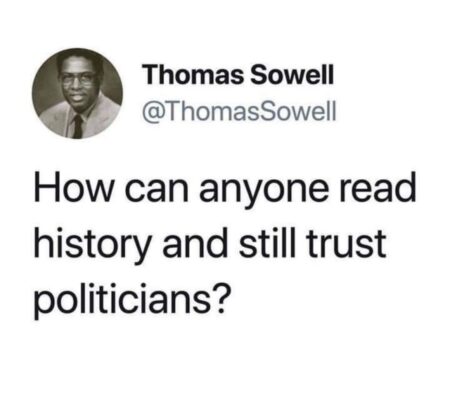Slavery is one of those topics, like abortion, that can’t just be brought up in casual company. – without knowing who stands where and on what, you might as well drop a lit-match into a room full of black powder.
People with opinions will share them. Those without will flee to avoid being a casualty. But since no one is arguing that the company we keep here is polite, we broach these subjects often and enthusiastically with the hope that it will expand the debate and arm us with some options. These are tools for prying the crazy back long enough to inform the innocent bystanders who hung around the way people watch NASCAR for the collisions.
To do this, we often seek the observations of experts, and when talking about slavery, it is difficult to get a better expert than Thomas Sowell. The man is brilliant, well-spoken, and fearless.
@bobanderson77, responding to a July 4 Tweet from Cori Bush in which he demands reparations, shared some of the wisdom of Dr. Sowell in rebuttal, and it’s …well, brilliant. Not all of it is new to our readers, but it is worth your time to be reminded and, most certainly, a valuable set of observations to keep handy should you find yourself confronted online by some progressive asshat.
“Of all the tragic facts about the history of slavery, the most astonishing to an American today is that, although slavery was a worldwide institution for thousands of years, nowhere in the world was slavery a controversial issue prior to the 18th century. People of every race and color were enslaved – and enslaved others. White people were still being bought and sold as slaves in the Ottoman Empire, decades after American blacks were freed.
“Everyone hated the idea of being a slave but few had any qualms about enslaving others. Slavery was just not an issue, not even among intellectuals, much less among political leaders, until the 18th century – and then it was an issue only in Western civilization. Among those who turned against slavery in the 18th century were George Washington, Thomas Jefferson, Patrick Henry and other American leaders. You could research all of the 18th century Africa or Asia or the Middle East without finding any comparable rejection of slavery there. But who is singled out for scathing criticism today? American leaders of the 18th century.
“Deciding that slavery was wrong was much easier than deciding what to do with millions of people from another continent, of another race, and without any historical preparation for living as free citizens in a society like that of the United States, where they were 20 percent of the population.
“It is clear from the private correspondence of Washington, Jefferson, and many others that their moral rejection of slavery was unambiguous, but the practical question of what to do now had them baffled. That would remain so for more than half a century.
“In 1862, a ship carrying slaves from Africa to Cuba, in violation of a ban on the international slave trade, was captured on the high seas by the U.S. Navy. The crew were imprisoned and the captain was hanged in the United States – despite the fact that slavery itself was still legal at the time in Africa, Cuba, and in the United States. What does this tell us? That enslaving people was considered an abomination. But what to do with millions of people who were already enslaved was not equally clear.
“That question was finally answered by a war in which one life was lost [620,000 Civil War casualties] for every six people freed [3.9 million]. Maybe that was the only answer. But don’t pretend today that it was an easy answer – or that those who grappled with the dilemma in the 18th century were some special villains when most leaders and most people around the world saw nothing wrong with slavery.
“Incidentally, the September 2003 issue of National Geographic had an article about the millions of people still enslaved around the world right now. But where is the moral indignation about that?”
..
